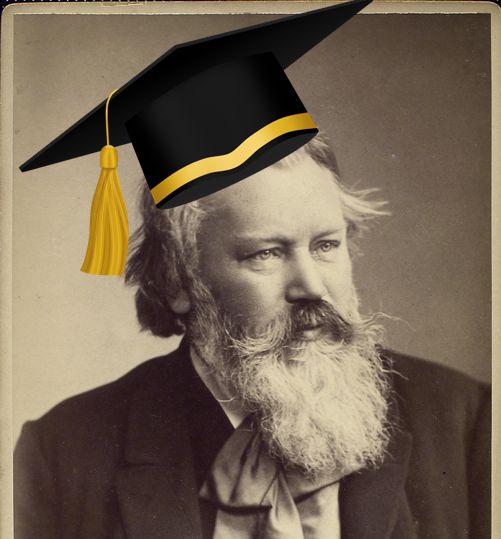Brahms: Academic Festival Overture

In honor of the class of 2023, who will soon be striding across the stage to collect their diplomas, let’s take a look at a piece written for just such an occasion. No, not Pomp and Circumstance, but Academic Festival Overture by Johannes Brahms.
In 1880, Johannes Brahms (1833–1897) was awarded an honorary doctorate in music from the University of Breslau (now the University of Wrocław, Poland). School officials asked Brahms to compose something for the ceremony that would match the solemnity of the occasion. Instead, Brahms turned out a lighthearted piece he called a “rollicking potpourri of student songs.”
Brahms’ Academic Festival Overture quotes four beer hall songs that would have been immediately recognizable to German college students at the time. The first song, “Wir hatten gebauet ein stattliches Haus” (“We have built a stately house”), introduced by the trumpets, had more political connotations than your average drinking song, however. It had been used as a theme song for a student organization that advocated for the unification of independent German principalities. The authorities had banned the song for decades. Though the ban had been lifted in most places by the official founding of the German Empire in 1871, it was still in place in Vienna at the time of the Academic Festival Overture’s composition. As a result, the police delayed the Viennese premiere of the work for two weeks for fear that it would incite civil unrest.
The second beer hall song Brahms quotes is "Der Landesvater" ("Father of our Country"), which can first be heard in the strings. The bassoons then introduce "Was kommt dort von der Höh?" ("What comes from afar?"), a song that was associated with freshman initiations. These three songs alternate before the full orchestra comes together in a rousing rendition of "Gaudeamus igitur" ("Let us rejoice, therefore"), a popular commencement song in Europe whose text dates back to a 13th-century Latin manuscript. Though the song was often used in official ceremonies, the lighthearted nature of the text, which exhorts the bacchanalia of university life, made it a popular drinking song among students.
While today’s audiences probably will not recognize the tongue-in-cheek musical references, it is still easy to hear that Brahms’ Academic Festival Overture leans more toward the “festival” part of its name than the “academic." It is also fun to imagine the students' stifled laughter when the piece was first performed and the school officials' probably less-than-enthused reaction. So, raise a glass of your beverage of choice, and toast the hardworking Class of 2023!



